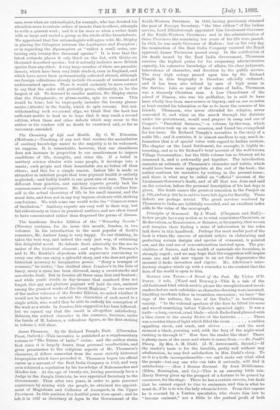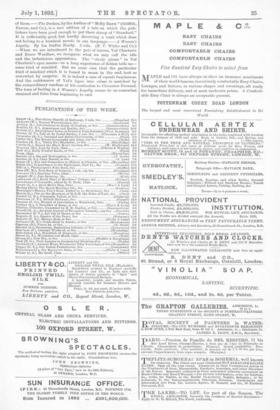NOVELS AND TALES.—A Secret of the Past. By Victor O'D.
Power. 3 vols. (Ward and Downey.)—This is a tale of the old-fashioned kind which used to please the unsophisticated zi ovel- readers before such subtleties as character-drawing were invented. Startling incidents follow in breathless succession ; we have " the rage of the vulture, the love of the Turks," in bewildering variety. "In the widened aperture of the door he lifted his moment a black, yawning void, with the fury of the night-wind rushing in through it." How does the reader like that? There is plenty more of the same sort where it comes from. —Dr. Panit's Theory. By Mrs. I. M. Diehl. (J. W. Arrowsmith, Bristol.)—If the reader's taste is for the horrible, pretty well without any adulteration, he may find satisfaction in Mrs. Diehl's story. To us it is a trifle incomprehensible—we can't make out what ailed. the people—but any one who can take it seriously, will find it satisfactory.—How I Became Eminent. By Jean Middlemass. (Eden, Remington, and Co.)—This is an amusing little tale. Harry Hervey gives up the prospect of a fortune to be gained by commerce, for the stage. There he has a certain success, but finds that he cannot expect to rise to eminence, and this is what he must do, if he is to win the lady whom he loves. From this impasse he is rescued by a Yankee speculator, who shows him how to "become eminent," not a little to the inautual profit of both them.—The Duchess, by the Author of" Molly Bawn " (Griffith, Farran, and Co.), is a new edition of a tale on which the pub- lishers have been good enough to put their stamp of "Standard." It is sufficiently good, but hardly deserving a rank which does not belong to a hundred novels in our language.-1 Woman's Loyalty. By Iza Duffus Hardy. 3 vols. (F. V. White and Co.) —When we are introduced to the pair of heroes, Val Charteris and Bruce Wardlow, we recognise what we may call the idle and the industrious apprentices. The "steely gleam" in Val Charteris's eyes means—so a long experience of fiction tells us— some kind of mischief. But we must own that the particular kind of mischief which it is found to mean in the end, took us somewhat by surprise. It is indeed a case of repents turpissitnus. And the suddenness of Val's lapse into crime is matched by the extraordinary candour of his confession to Clemance Everard. The tone of feeling in A Woman's Loyalty seems to us somewhat strained and false from beginning to end.











































 Previous page
Previous page